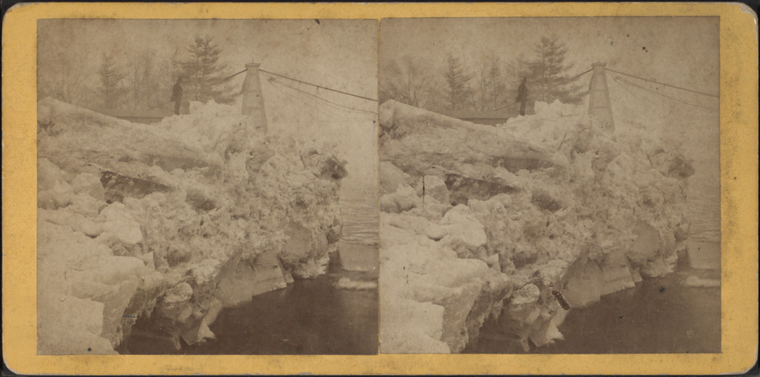We survived the arctic chill!
Am sure we can all now breathe a collective sigh that things didn't get much worse than they did.
Besides, Montague didn't hit the minus 16 degrees recorded this morning at the weather station in nearby Walpack.
Over a hundred years ago, the Port Jervis
Tri-States Union Newspaper in 1904/5 related:
The Delaware a Solid Mass of lce.
It is said the condition of the Delaware
river at present is unusual, that the river
is frozen almost solid, with only a small
channel in the main body of the stream,
and that between Port Jervis and Deposit
one can cross at almost any point.
What all this pressages when the break-up
comes, is a matter of much speculation.
Am sure the only people ever to fully welcome the deep freezes were those who harvested ice!
Back in Jan. 1893, that same newspaper reported:
Proprietor St. John of the High Point Inn, is cutting ice from Lake Marcia and will soon have his ice house filled.
High Point Inn had preceded High Point Lodge / Kuser Mansion
Ice views in the Delaware River, Port Jarvis, N.Y.
after the Flood, March 17th, 1875.
by Masterson, E. P. -- Photographer
 |
| Courtesy https://digitalcollections.nypl.org/items/510d47e1-a6e0-a3d9-e040-e00a18064a99 |
Should the ice begin to break up, rather than slowly thaw out, there is always a risk of ice jams forming. One major one occured in our area in 1982.
This will give readers a sense of what can occur, as related in this excerpt from a Jan 28, 1904 article in the Tri-States Union:
Sunday at about 3 o'clook, the ice
broke up in the Delaware river, caused
by the excessive pressure of ice and water
from above. The people were on the
lookout for a break-up, and the news
quickly spread, and within a half hour,
the banks of the river were lined with
people eager to see the sight, while others
hurried to the homes of friends in the
southern part of the town and at Tri-States
to render aid, if necessary.
The ice crammed and crunched down
the Delaware, and the water rose rapidly,
and backed up in the Neversink River,
thus breaking the ice in that stream and
causing the water to rise about five feet in an hour.